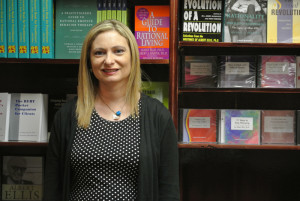by Deniz Sidali, M.A.
It’s never easy to lose someone you love when they pass away. I always worried one day about losing my loved ones, how I would react and feel, and whether I would be able to weather this inescapable, inevitable life changing event. When my grandmother died two days after Christmas, I felt a wave and array of different emotions. Understandably, I felt sadness over losing her, regret about whether I could have cared for her better, guilt about carrying on and enjoying my life, and relief that she wouldn’t have to suffer anymore.
But, I was also in a state of confusion, probably shock and numbness. The confusion and numbness probably stemmed from being enmeshed with my grandmother as her care giver for several years and feeling as though I lost a part of my identity when she died. I realized that grief is a complex process that varies for each one of us. And that it takes times to heal and healing cannot be rushed. Healing for me would mean cognitively and emotionally processing her loss and that I wouldn’t see her in my lifetime again. For me, the experience of losing a loved one was unlike anything I had imagined. The thought of losing the person I loved and cherished the most in my life was much worse than the actual experience. Maybe because I had time to contemplate that my grandmother would die someday soon and that I needed to accept this unfortunate fact without having to like it (unconditional life acceptance).
Oftentimes what I found helpful was to challenge my irrational beliefs by asking myself what my grandmother might advise me to do. So, for instance, when I considered possibly not attending internship interviews or quitting my job, I would engage in catastrophizing thoughts which were not helpful. These thoughts included, “I can’t handle this right now”, “It’s too hard to imagine that I will never see her again”, “My grandmother must be alive again for me to go on with my life”. As I was driving a long distance to an internship interview, I had time to contemplate these irrational statements. I asked myself, “What would grandma tell me to do?” My grandmother was an extremely resilient woman and a positive role model for me. She would tell me to never give up, not to have any regrets, to remember her fondly and honor her legacy by carrying on and actualizing my dreams.
Considering my grandmother’s wishes for me enabled me to challenge my irrational beliefs rooted in catastrophizing by telling myself repeatedly whilst driving, “It’s not pleasant that grandma died, but I can handle it”, “Losing my grandmother was a life changing and humbling experience, but I need to accept it without having to like it”, “The timing of her passing was not great but there isn’t a perfect time for losing your loved one, and I need to accept this”, and “Although I would prefer my grandmother to be alive, nothing I can do will bring her back”.
Being a spiritual person, I decided to keep her memory alive, continue to love her, and honor her legacy until we hopefully reunite one day in the afterlife. And I made a conscious decision to live my life the way she would want me to and to become the strong, resilient woman like she was. I pushed myself to do behavioral activation by going out, running errands, eating balanced meals, watching movies and not isolating myself all while realizing that grieving is a natural, healthy process that needs to occur in order to make sense of losing a loved one.

